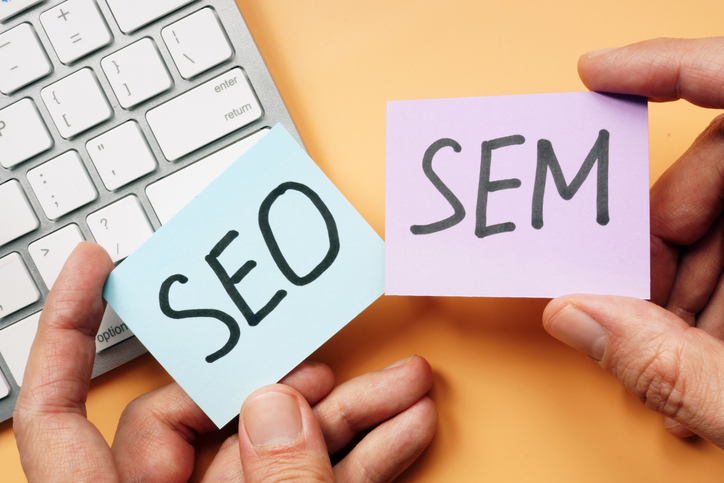Quick Navigation:
As a business, you want to increase your brand awareness and online visibility. Although SEO is sometimes used to describe both optimization strategies and SEM, there are differences to be aware of so you can incorporate both separately in your strategy or focus on one over the other. A well-constructed digital strategy can increase the amount and quality of your website visitors.

Image via Unsplash by austindistel
What Is SEO?
SEO stands for search engine optimization, which is when you optimize your site so that you can appear on the search engine results page when a potential customer performs a search query. SEO involves knowing what your potential website visitors are searching for and performing certain actions to enhance your site so it’s more likely to rank higher up in results and attract the attention of people who would benefit from your products and services.
What Is SEM?
SEM, or search engine marketing, is when your search engine strategies involve paying to increase your visibility in search results. Companies pay for advertisements on search engine results pages (SERPs) with the goal that their target customer clicks on their advertisement to visit their website and learn more about what they offer. The paid ads appear at the top and bottom of SERPs, and brands only get charged for their advertisement once a user clicks through to visit the website.
What Are the Similarities and Differences Between SEO and SEM?
Both SEM and SEO are channels to market yourself and your business, and knowing how they are similar and different will help you get going.
Similarities Between SEO and SEM
- Both help you understand your audience. For either part of your strategy to be successful, you will be forced to learn more about your potential customer, which is always a good thing.
- SEO and SEM increase the number of people who see your website. Both use keywords to make sure your target customer notices you.
- Neither is one and done. You will always have to evaluate and test your SEO and SEM strategies if you want to experience as much success as possible.
- Both contribute to more high-quality web visits. Not only will you have more website clicks, but they will be from high-quality visitors that are likely to move forward with purchasing.
How SEO and SEM Differ
The major difference is that SEO is not a paid strategy and SEM is. The other differences include:
- SEM gives you quicker results. Especially if you’re a new business, SEM can substantially boost your online visibility and fast. SEO takes time before you’ll notice your strategy paying off.
- SEO continues to increase in value. Your SEO strategy continues to bring you valuable leads, whereas your SEM ads will stop displaying once you turn them off.
- The way you test what works is different. It’s easier to test your SEM strategy because you can change different aspects of your ad and see how it performs. SEO can be tested too, but since it works mostly with the algorithm, it takes more time and effort.
Which Is Right for Your Brand?
While there may be a place for both SEO and SEM in your marketing strategy, consider focusing on one over the other so your efforts make the most impact. Consider the following to decide:
- Your competition – Because SEM involves paying for your position in search engine results and SEO doesn’t, it’s important to know how much competition you have for your set of keywords. If you have a lot of competition, then SEM may be a better choice for you because you can be more sure of getting in front of your preferred audience. Sticking with only SEO is better for those businesses that have a unique value proposition that people are searching for online.
- How long you’ve been in business – If you are a new business or only have a small following, then SEM can provide you with some instant visibility. You can build your SEO while taking advantage of what SEM brings, but it’ll take more effort than it would for a business that is established and already has some domain authority.
- Your industry and market segment knowledge – If you’re very familiar with your industry, your market segment, and your target demographic and their needs, then you can develop an SEO strategy that works. With SEO, you’ll be able to optimize your site for specific keywords that your target audience is searching for. SEM is great if you need to learn more about your market because you’ll be able to understand their intent more quickly.
- How well your website is currently performing – Choose SEO if you are happy with your current organic search strategy and it’s working for you. You may not need to utilize SEM at all if you can create content that is optimized for certain searches and you get the quality visits you need. SEM is optimal for those brands that want to see their website traffic improve.
- The average cost per click – Each industry has a different cost per click (CPC) that depends on how competitive the industry is and the cost of the products or services that the average business in the industry provides. If your industry average CPC is low, then consider SEM. If it’s not, then SEO may be a better option for you.
- The length of your customers’ buying cycles – To understand your customers’ buying cycles, you must have a firm understanding of how they ultimately arrive at purchasing your product. Their buying behavior will make a big difference in whether SEO or SEM is the best choice for your brand. Use SEM if you have learned that your customers know what they want and don’t put a lot of research or thought into making their purchase. You can appear in search engines and immediately entice them. SEO is better if your customers wait a while before committing.
Even if you’ve decided which marketing channel is best for your brand, consider hiring an expert who you can work with to fine-tune your online efforts. That way, you can build your online presence, increase sales, and make sure that your ideal customer is noticing you.
Knowledge Base: Intro to Marketing



